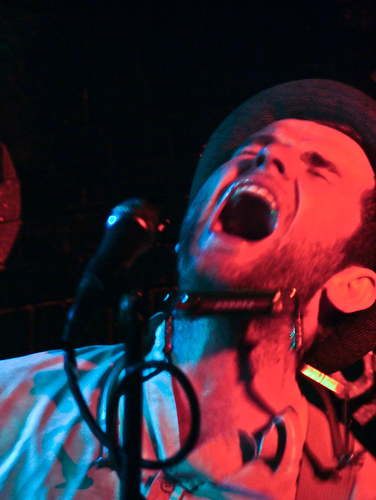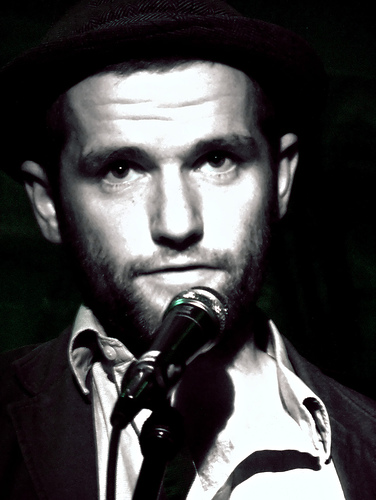Immortal Technique has been on the scene, steadily gaining in influence and word of mouth for several years now. His first two albums, Revolutionary Vol. 1 and Revolutionary Vol. 2 redefined what rap music could be by not just mentioning public and political issues, but by intelligently, eloquently and powerfully incorporating them into a coherent message meant to spur action in the listener.
On this blog, we’ve previously reviewed an Immortal Technique show, as well as given many readers a first glimpse of Tech’s highly anticipated new album with DJ Green Lantern, The 3rd World. Last week I had the opportunity to speak with Immortal Technique and ask him a few questions. Due to the length of the conversation, and in preparation for the June 24th release of The 3rd World, I’ll be posting this interview in 3 parts, because how else can you tackle posting an interview where you talk about everything from writing rap lyrics to local politics in over 9 pages? Check back later this week for parts 2 and 3 of the interview with Immortal Technique.
AC: I want to start first by talking about your music in general, then I want to talk about The 3rd World release and the recording industry specifically, and then I’m going to ask you a few questions about your ideologies, political philosophies and views on some of the current global issues.
One of the strongest things about your music is that you remain independent, and you’re honest and unfiltered. On your first two albums, you incorporated a wide variety of styles from songs like “Caught in the Hustle,” which has a very South American sound to “Freedom of Speech” that borrows from Pinocchio. You also routinely include lyrics in Spanish. On The 3rd World track that I’ve heard, “Golpe de Estado,” has Spanish lyrics over a Godfather song. What’s your process in terms of writing your lyrics, and finding the music for them when it comes to your Peruvian birth, Harlem upbringing, and subsequent global experiences?
IT: I think that all of these things bring themselves together in a crux of cultural diversity. I’m from New York City, which is very different from the rest of America I must say. Anyone who is reading this who is in New York, or anyone who is reading this from a place in San Francisco or a place in LA, they have to realize that these large cities are very different than what the rest of America looks like.
Due to the fact that we have so much influence from other places that even Hip-Hop itself comes from the fact that Kool Herc brought all these records back from Jamaica and started spinning different things, and the African drum influence comes from so many different cultures and we have so many different people to thank for the advancement of this type of music. And I think that that being the case, it’s just another example of diversity for me about the music that I make.
AC: In your online postings and your blogs and song lyrics, you have a vast knowledge of social, economic and political issues and you cover a lot of topics almost all at once. Then at other times, the battle aspect of your rapping background comes out more. When you’re writing your lyrics, how do you approach dissecting a topic that you want to talk about and forming the structure of the message that you’re trying to get out?
IT: It really depends. There are some songs that have taken me, for example, two or three years to write. Something like “Dance with the Devil.” Then there’s a song like “Bin Laden” that took me one night to write. I wrote “Point of No Return” in a week, I wrote “Caught in the Hustle” in an afternoon. So I think that it just depends on how inspired I am. And not just how inspired I am by a track or if one takes longer to write, it doesn’t mean I’m less inspired by the subject matter or by the effect it’s had on my life, but more in how I’m inspired about conveying that message. Because something may be a little more delicate in terms of the way I want to analyze it in my mind, say, listen, this is surgical precision that I need in order to get this subject across because it deals with something so serious. Not that stuff that I write very quickly doesn’t deal with something serious, but maybe it’s a more natural flow and it’s more like, alright, I just feel this right now, so worse comes to worse, I come and edit the lyrics later. Sometimes I edit them, sometimes I don’t. So it depends a lot on the conceptuality of the record, that’s usually what it starts with.
In the past, when I was in prison, I just wrote lyrics that were based on what I felt and what I was seeing around me and what I was seeing going on in the world even though I wasn’t there, and how I felt about that. And how I felt about being a slave. The reality about me being released and saying to myself, “Hey, I’m actually free,” and all the different levels of freedom I felt. Because when I was incarcerated, I felt like I was trapped. Then, when the CO’s threw me in the hole and 23/1 where I’m in a restricted housing unit and I only get to leave my cell for half an hour a day, you know then I think I’m even more trapped. I get out of that and think I’m free, then I get out of prison and I think I’m free but I’m still on parole, then I get off parole and think I’m free, but I still can’t get a regular paying job because of my criminal record, and I can’t get into Canada because they won’t let me in there because of my criminal record.
So there are lots of degrees to the way I perceive things, and I guess the change in my life and the way that I conduct myself, and my maturing process, not just my voice getting a little deeper and raspier because of the 100-150 shows I do a year, but all these factors coupled with the evolution of my flow and how I decided to make music has definitely changed the way I do songs now. Whereas in the past, I might have wrote verses first and then found a beat, now it’s more about constructing a concept, then maybe getting a hook together, and then structuring lyrics that really cement the subject matter into one perfect unison.
AC: It’s one thing to be on an independent label, and then it’s another thing, like you, to have complete control over your lyrics, your music and your message. Could you talk a bit about the beginning to end process that you have to personally go through to create an album where everything on it is yours?
IT: (long sigh) Ya, that’s the process. That’s the process right there. Work, work, work. Like you just said, you summed it up, I have to do pretty much everything myself. I’m learning to delegate responsibility a lot more, but most of it still falls on my shoulders. And while I have people that help me out like the people at Viper Records, and people that help with the visuals, and then I have people who are constantly trying to come in and contribute whatever they can, I appreciate all of that. I don’t ever look down on anybody just based upon what their particular position is, because I started out not being very well known, just selling my records around the hood, and then when I was finally able to expand my fan base, I never ignored the people that originally bought my records. I never changed my style up to suit other people and make them feel better about themselves. I still wanted us to be able to talk about the problems that we have, but not just in a complaining manner, but also how to fix them, how to take personal responsibility for some of our issues, or I should say for all of our issues, because we’re the only ones who are going to fix them, not somebody else.
It’s definitely an incredibly huge process from the conceptualizing of all the records like I just said, to writing all the lyrics, cause don’t nobody else write music for me. Sometimes I bring samples to people because I want to use these specific samples, or I’ll come into the studio with a melody in my head and be like, “Can we play this out,” and people will say alright. When I have to meet up with other MCs, or I have to get to someone else’s studio, I’m driving up there myself. A lot of do it yourself stuff, of course, that’s why I get the lion’s share of the paper.
AC: That provides a perfect segway, as the next couple questions I wanted to ask are dealing specifically with The 3rd World. This album has been highly anticipated and the collaboration with DJ Green Lantern is kind of a new direction for you. How did the idea for this collaboration come about?
IT: Well, it’s a new direction in the fact that I’m doing an album with him, but I’ve done plenty of songs with him in the past. I did the “Bin Laden” remix and the original “Bin Laden” back in 2004, and I did the “Impeach the President” in 2006, and I just recently was featured on the Grand Theft Auto 4 soundtrack that he was on. So I’ve always worked with Green Lantern, it’s just that I had originally come to him telling him I wanted to do a mixtape, and he had come to me telling me, “I don’t want to do a mixtape, I want to do an album, I want to have an album in stores,” and I was like, “Alright, we’ll make that happen.” And he was telling me, “Whatever I need to do to help you with that, let me get you some instrumentals,” so he gave me some instrumentals, and we basically started out doing stuff for The Middle Passage and Revolutionary Vol. 3, but eventually, it became such an overwhelming display of music. Not that it didn’t match the conceptuality of The Middle Passage, although some of the songs didn’t, it was more of the fact that it was its own project as soon as I stepped back from it. I was like, “Wow, I have like 19 songs here. What the fuck? I’m sitting here with 20 songs, I’m sitting here with 25 songs.”
Some of these are definitely for The Middle Passage, some of these, like the song “The 3rd World” talks about the correlation between poverty here in America and police corruption here in America, and those same issues being mirrored in the Third world. To me, it was incredibly important to make those subjects known, especially now since we’re going into a different political climate. It’s important not to lose sight of that, because I feel like certain demographics of people in this country benefit from their relationship with the places they come from, and why shouldn’t Black and Latino people have the same? Why shouldn’t we be able to express ourselves on a national platform? I think the fact that Latino people have allowed immigrants to be demonized so much, that’s not all on the White media, that’s on us, because we’re living with that, it shows us how weak and pathetic our community leaders are in the face of all this stuff, because they put up the most minimal struggle. I really think that there has been a complete under representation of the struggle against this. One march on May Day is the culmination of all this? It’s an ongoing fight that’s never going to end, and yet we’re not unified about this, and that’s why they’re capable of demonizing us and vilifying us, and I believe it’s a disgrace to our people to allow something like that. So it’s a personal responsibility of our people to get it together.
Follow this link to part 2 of this interview where Tech talks more about The 3rd World, the music industry and global politics.






